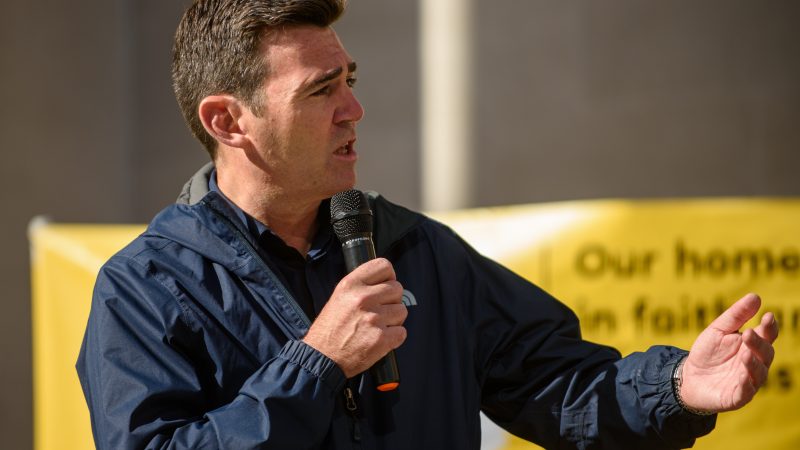
The next election will be fought on public services. Last month’s historic move in Greater Manchester to put the public back in the driver’s seat is essential for Labour to cut through: it’s time to expand public control to other key services, starting with water.
Last month saw the combined authority take its buses into public control, ending a 37-year experiment in what a former UN expert labelled “extreme” privatisation. The new system sees profits for private operators halved with the public able to hold them to account through the local authority, even raising the possibility of barring them from the region if they fail to deliver a decent service.
Burnham’s success shows the public’s desire for control of services
The journey to introduce the now iconic ‘Bee Network’ shows just how much desire there is for more control over local services. In Greater Manchester, a first of its kind local poll showed that only 5% of people disagreed with plans to take buses back into public control.
Empowered by these results, Andy Burnham ran his campaign for re-election as regional mayor in 2021 as a referendum on taking back these local services. He announced his decision to take back the buses on the day before the pre-election period kicked in and then ran against a Conservative candidate intent on stopping the change.
Against a terrible backdrop for Labour at the local elections — where they lost more than 300 councillors and saw councils like County Durham pass into no overall control for the first time in 100 years — Burnham won. He won in the first round. He won more than two-thirds of the vote. He won every council, every constituency, and even every ward.
And in his victory speech, his first messages to the public weren’t about tax and spend, economic growth, or even — as important as these may be. He was immediately committing to be back out on his first day as the newly-elected mayor to announce more plans for his publicly-controlled Bee Network buses.
Labour mayors across the country are following Burnham’s lead
Greater Manchester isn’t the only place where Labour in power is making public control and ownership a priority. Nor is it the only place they’re seeing the benefits. In West Yorkshire, Robert Peston put Tracy Brabin’s election as mayor in 2021 down to her bold policy to start the process of taking buses into public control in her first 100 days.
In Liverpool, Steve Rotheram’s publicly-owned Merseyrail trains and buses have been designed in consultation with the public.
In South Yorkshire, Oliver Coppard is taking the Supertram back under public operation as well as moving through the process to take back his buses at “record speed“.
In fact, if the rumours coming out of Bristol are true, this week may see all of Labour’s mayors moving towards public control of buses.
It is no surprise then that Shadow Transport Secretary Louise Haigh has committed to rolling these powers out across the country to every council area that wants them.
Labour’s vision for empowering communities must go beyond transport
But confining the electoral gold dust of giving communities control over their essential services to the area of transport would leave Labour’s MPs fighting the general election with one hand tied behind their back.
Polls confirm that more than half of the electorate, including 2019 Conservative voters, will see sewage spills by private water companies impact the way they vote at the next election. Even more of the public (69%) support taking water into public hands.
The Labour Party’s current plans, to leave private companies in charge with a marginally empowered regulator, will fall short of the public’s ambition to improve services.
Around the world, taking water into public hands has been increasingly popular. Since 2000, elected governments have taken water into public hands in well over 300 places. The most striking thing about these numbers is that the places usually held up as examples to support privatisation have seen the highest levels of remunicipalisation. Take France and the US, which have seen 109 and 71 water services taken into public hands respectively.
Services that work for people – not profit – must be a Labour priority
Any concerns Labour has about the costs of promising public water can be dismissed. Powers exist under current legislation to prioritise the public over shareholders. In the tradition of the Blair government, Labour could use special administration to take over a failing public service that is putting the health of the nation at risk. Railtrack, the name of Network Rail when it was privatised, was taken into public hands through these powers and the compensation to shareholders set to protect the public purse.
Alternatively, two-thirds of the public support taking shares off water companies instead of cash fines. By taking cash-generating assets as compensation for pollution, a Labour government could begin to hand a voice to local communities by placing civil society representatives, such as Surfers Against Sewage, on company boards as happens in public water companies in Grenoble, Paris and beyond.
The Conservatives have seen the opportunities that public ownership can bring. Conservative mayors in Birmingham and Cambridge have explored taking back buses, while the Tees Valley mayor bought the local airport. Even in Westminster, Conservatives have taken back LNER, Northern and TransPennine into public operation with parts of the energy grid also being bought back.
Labour cannot afford to cede this ground. To put itself in a strong position ahead of the next election, it must learn the lessons from Burnham’s victory and put services that work for people, not profit, at the heart of its manifesto.




More from LabourList
Nudification apps facilitate digital sexual assault – and they should be banned
Diane Abbott suspended from Labour after defending racism comments
Labour campaign groups join forces to call for reinstatement of MPs